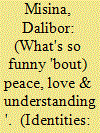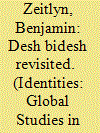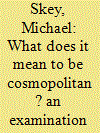|
|
|
Sort Order |
|
|
|
Items / Page
|
|
|
|
|
|
|
| Srl | Item |
| 1 |
ID:
120790


|
|
|
|
|
| Publication |
2013.
|
| Summary/Abstract |
The article examines current rock culture in the Balkans as a potential vehicle for rebuilding the broken sociocultural bonds between the different post-Yugoslav societies and for creating a constructive cultural space for articulating new forms of civic and post-nationalist identities. The argument offered is that, after the sociocultural exile during the war years, rock culture in the post-conflict Balkans has considerable potential to establish itself as a popular-cultural force of 'utopian transcendence' of the current ethno-nationalist sociopolitical moment, and as a catalyst of the new post-Yugoslav spirit of openness, tolerance and peaceful coexistence.
|
|
|
|
|
|
|
|
|
|
|
|
|
|
|
|
| 2 |
ID:
120791


|
|
|
|
|
| Publication |
2013.
|
| Summary/Abstract |
HIV sensitisation campaigns often aim to empower people living with HIV or AIDS (PLWHA) to enable them to cope with their illness by getting on with normal life as best as they can. However, contained within these messages are implicit assumptions about the needs of PLWHA. This research found that in Jamaica PLWHA's reproductive health needs are considered to be met largely by condoms. However, PLWHA respondents in this study expressed desires to have children and felt that their right to this was being denied. As such, dominant HIV sensitisation messages fail to respond to Jamaican PLWHA's own perceptions of their needs. This information is of importance, as the focus of the international HIV response moves away from simply preventing new infections to supporting those who have already been infected through locally appropriate interventions. As part of this, local perceptions need to be acknowledged 'up-stream' in HIV programming.
|
|
|
|
|
|
|
|
|
|
|
|
|
|
|
|
| 3 |
ID:
120787


|
|
|
|
|
| Publication |
2013.
|
| Summary/Abstract |
This article discusses the emergence of a 'British Bangladeshi social field'. It makes two connected arguments about its effects. First, it argues that the emergence of the British Bangladeshi social field has rendered the discourses of desh and bidesh less important. Second, it argues that British Bangladeshis are embedded into many transnational social fields and lead multiply orientated rather than binary lives. It uses the example of the importance of the global Islamic umma (community) to British Bangladeshis to illustrate this and argues that it has also contributed to the decreasing importance of the discourse of the desh. What this shows is that the transnationalism of today is very different from that of 20 years ago, both in terms of how it is experienced and how it is analysed.
|
|
|
|
|
|
|
|
|
|
|
|
|
|
|
|
| 4 |
ID:
120789


|
|
|
|
|
| Publication |
2013.
|
| Summary/Abstract |
In many ways, the structural violence of settler colonialism continues to dominate the lived experience of Indigenous populations, including Aboriginal and Torres Strait Islander peoples in contemporary Australia. One aspect of this structural violence concerns the regulation of Indigenous identity, today perpetuated through state monitoring of the 'authenticity' of Aboriginal people. This article argues that the contest over Indigenous identity perpetuates a form of symbolic political violence against Indigenous people. It considers the ways in which structural violence against Indigenous identity has featured in Australia's settler colonial regime and examines the particular violence faced by urban-dwelling Aboriginal people, who endure much contemporary scrutiny of the 'authenticity' of their Indigeneity. As a case study, the article examines the symbolic violence associated with a particular legal case in Australia and, in light of this analysis, concludes that settler colonies could make a decolonising gesture by legislating for the protection of Indigenous identity.
|
|
|
|
|
|
|
|
|
|
|
|
|
|
|
|
| 5 |
ID:
120788


|
|
|
|
|
| Publication |
2013.
|
| Summary/Abstract |
The discussion of marriage migration in Denmark primarily has focused on citizens of immigrant descent ('New Danes') who marry partners from their ancestral homeland (often Turkey or Pakistan). This type of marriage migration was the target of the strict Danish family reunification policy instituted in 2002. This article examines the genealogy of the morality underpinning the family reunification policies and asks whether the rules actually promote this moral agenda or have unintended consequences. Empirically, I shift the focus from immigrant Danes to native Danes who marry Cubans. Finally, while little attention is paid to the non-western country involved, transnational marriages always involve two nations. This article investigates how state policies on both ends of this migration trajectory shape moral-territorial borders that transnational couples navigate.
|
|
|
|
|
|
|
|
|
|
|
|
|
|
|
|
| 6 |
ID:
120786


|
|
|
|
|
| Publication |
2013.
|
| Summary/Abstract |
The literature on cosmopolitanism has mushroomed in the past decade or more as attempts are made to theorise new patterns of mobility, interactions between previously distant social groups and the emergence of institutions to manage these processes. In this paper, I build on the arguments of those who have emphasised the strategic aspects and temporal dimensions of cosmopolitan expressions and practices, by focusing on the resources and constraints that different actors operate with, or under, and, as a result, the varying commitments they have to different 'others'. Using this type of grounded approach, a number of Illustrative examples from a study of social identities in England are then analysed and used to theorise cosmopolitanism, as a perspective that is periodically articulated, in relation to specific needs, contexts or prompts, rather than being an inherent property of particular individuals, groups or situations.
|
|
|
|
|
|
|
|
|
|
|
|
|
|
|
|
|
|
|
|
|